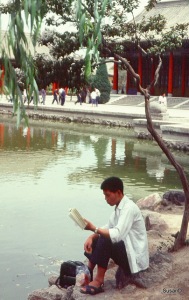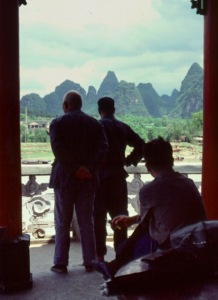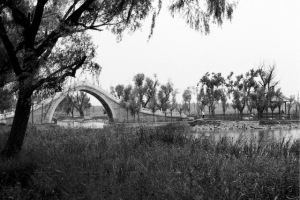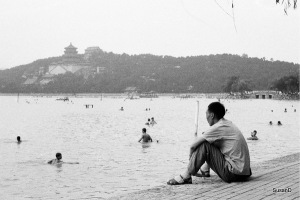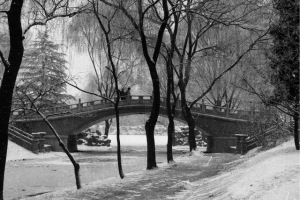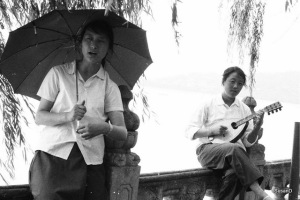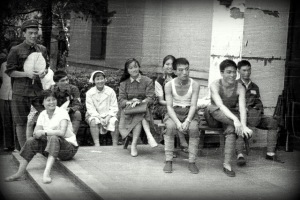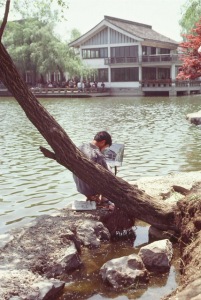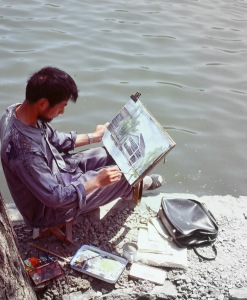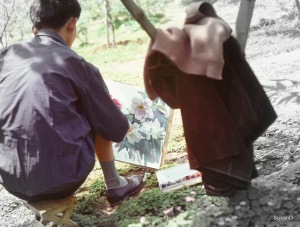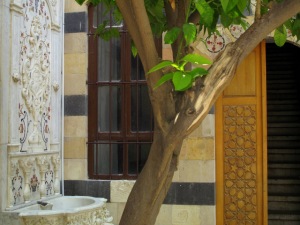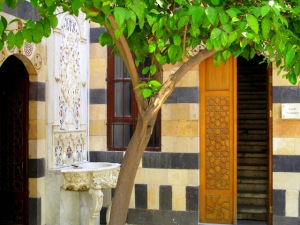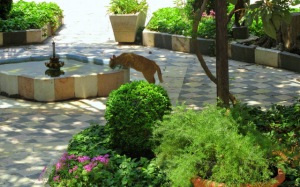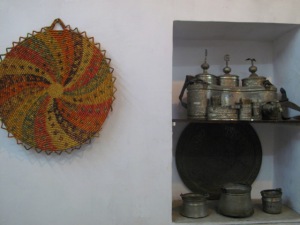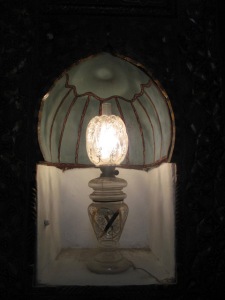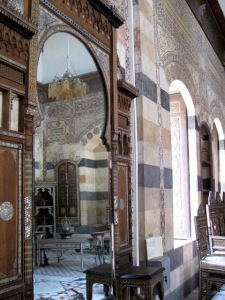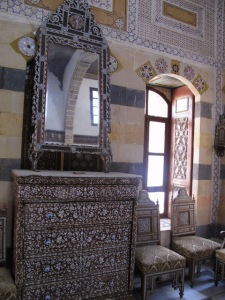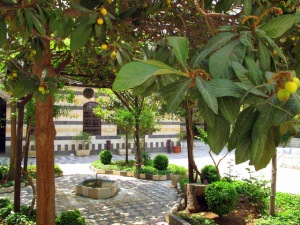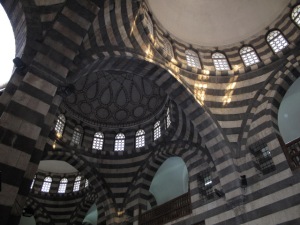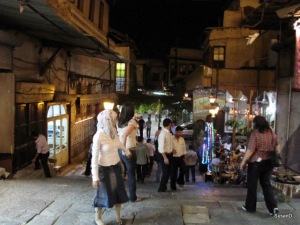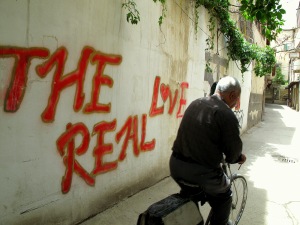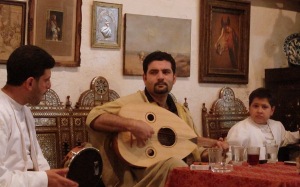Images: Taken in Damascus prior to the ‘Arab Spring’
Tuesday 26 May 2015
Dear Geraldine Doogue and ABC Saturday Extra Team,
In response to interviews on Saturday Extra, I used to submit comments on your webpage. Indeed, some of my comments were read on your program.
I was very grateful for the opportunity you gave listeners to present alternative views to those of your interviewees. It meant the stands your guests took on certain topics could either be challenged or reinforced. A discussion was generated.
However, in August 2014 Saturday Extra’s online Comment section was closed. This was a great pity. Now, there is no evidence of comments on your pages prior to August 2014. Have they been censored?
(I note that it is still possible to submit comments on the Phillip Adam’s Late Night Live page, so I assume the decision to make it impossible for listeners to have a say on your webpage was made by Saturday Extra, not by any ABC heavies.)
As an anti-war activist, I believe it is especially critical that there are public challenges to the mainstream narrative on wars. For great powers to wage wars there must be misinformation and sophistry in the mainstream media. Such spin is sometimes evident on your program – and now it goes unchallenged.
Bertrand Russell, a pacifist during the First World War, reflected years later on his experience. He wrote,
The most difficult period in which to keep one’s head was the very beginning… One by one, the people with whom one had been in the habit of agreeing politically went over to the side of the war, and as yet the exceptional people, who stood out, had not found each other. But the greatest difficulty was the purely psychological one of resisting mass suggestion, of which the force becomes terrific when the whole nation is in a state of violent collective excitement.
Today, I have set up this page for comments on Saturday Extra. They include views published before and after the Comments section was closed last year.
Yours truly,
Susan Dirgham
**********************************
Broadcast on Saturday Extra on 23 May 2015
Guest
- David Kilcullen
27 May 2015
Dear Geraldine,
In your interview with David Kilcullen, there was every sign that you accepted his point of view without question despite his being someone who works closely with the deadly U.S. war machine in Iraq and the region.
Yes, Kilcullen is an ‘expert’ in that he has spent time in the ME and he has studied terrorism. He is eloquent. He is personable. He is an Aussie: he seems calm and reasonable. But in his work for the U.S. military, what truths does he omit, what ‘facts’ does he invent?
Can he represent the aspirations of Iraqi and Syrian people who want their countries to be united, stable, peaceful, prosperous and free of foreign interference?
Or do their aspirations inevitably clash with powerful interests in the United States? Would Kilcullen’s work with the U.S. and Australian armies compromise him in the eyes of most Iraqis and Syrians?
The fact that David Kilcullen can put on his CV, “In 2003, I did not support the war in Iraq” would be irrelevant to most Iraqis since he has effectively supported the American war machine ever since.
In 1991, American war planes strafed or bombed one to two thousand Iraqi military vehicles on a 60-mile stretch of highway. They killed thousands of retreating Iraqi soldiers returning from the disastrous war in Kuwait. It was dubbed the “Highway of Death” and memories of it would be etched in the brains of Iraqis. One U.S. pilot is quoted as saying, “It was like shooting fish in a barrel”.
The fact that the people of Iraq and the region have no reason to honour the United States is a no-brainer.
As a spokesperson for the ME war plans of the American Administration, David Kilcullen will not, cannot, present events through the eyes of the ordinary people of Iraq or Syria, the people who are traumatised, terrified, maimed and killed. In Australia, those who stand up with strong and eloquent voices against war, sectarianism and division are not given a chance to challenge his views.
But who will present their stories and hopes and dreams to the Australian public? Unless we seek them out, we are diminished.
One hundred years ago, the Anzacs swore allegiance to their ‘Lord the King’ and so it was the Imperial plans of Britain they fought for. Today, in Australia, particularly in the media, there seems to be an unwritten, unspoken allegiance to the Imperial plans of the United States.
The Middle East was a world away in 1915. Today, there are many Australians who have an allegiance to one side or another in the wars there. The blood lost there is mourned here. The hatreds simmering there are simmering here, within our own communities.
It is not the time for allegiances to empires or caliphates. To be supreme, both must seek to divide, destroy and brutally kill. Instead, it is the time for seeking our most precious of human values and for seeking the truth. Only by doing so can hatred, wars and terror be stopped.
How often must we be reminded that ‘No man is an island’?
The charm and sophistry of David Kilcullen, and his reliance on sectarian terms to describe the war in Iraq, are not a substitute for the voices of the people of Iraq and Syria who live in a hell the United States and its allies have engineered. Iraqi and Syrian people who want to end the terror and war have spokespeople. Let’s not imagine they are unsophisticated natives. Let’s not ignore them. Let’s learn about their lives and hear their voices.
In a video interview in early 2014, Monsignor Jacques Behnan Hindo, Archbishop for Syriac Catholics stated,
There is always fear. There is always anxiety. We live with the same anxieties. We are waiting for salvation. Unfortunately Geneva (2 conference) has not yielded anything yet. And, even more unfortunately, the United States, France, yes, France – and England do nothing except add poison to things …by aiding these opposing … these faction, more than half of which have come from outside (Syria). And when one comes from outside (Syria), he/she does not want what is good for Syrians but rather massacring them. And then they want to declare an Islamic State. And we as Christians cannot accept that. I am not a masochist. I do not accept to get flogged. I cannot accept these people, purely and simply. And when I hear Kerry or Fabius, these people who take their fake humanitarian sentiment, I ask myself: “What are they doing?”… (A political solution) is always possible. However, first thing that must happen is for these terrorists to leave. This is an essential condition. And when they are out, we Syrians can come to an agreement. We had already several towns where the Army entered because residents had had enough, and they expelled the foreigners that were in their town. And now they live much more quietly. In our region, it is the same thing … in all the cities and villages of the north. Yes, there are people who oppose (the state). I myself am not that much for the government. However, when I compare what awaits me with these people to what I have today, I say to myself: “I am doing very well today.” And I wouldn’t want to put Fabius in my place… when these people come and occupy the country. I do not want to see Fabius, Kerry, or the others. But they are not supposed to understand that they will never be here. That is why they are screwing around. Excuse my expression. They are screwing all Syrians. I wrote a letter to Obama and I told him that, in his name Barack, there is the word Baraka (blessing). However, when he sent all his fleet, it was to declare war. It was a curse! Between a curse and a blessing, there is a huge difference.
(Question: Are you able to maintain hope?) I am, even physically, very optimistic. And then I always have the hope of Christ. I always believe that even Christ on the Cross had the light of resurrection behind him. Therefore it will come. The torment and the fear might extend for a while, but it will be over. And we shall live. I have a lot of hope. That’s why I tell my people not to immigrate, because we can turn our region, our country, into another Switzerland. There is absolutely everything to make it happen. There is intelligence, money, land… everything. Therefore nothing is missing in order to live a life much better than before, in 2 or 5 years from now.
Sami Ramadani, a political exile from Sadam Hussein’s regime wrote in The Guardian in June 2014,
The most serious sectarian and ethnic tensions in Iraq’s modern history followed the 2003 US-led occupation, which faced massive popular opposition and resistance. The US had its own divide-and-rule policy, promoting Iraqi organisations founded on religion, ethnicity, nationality or sect rather than politics. Many senior officers in the newly formed Iraqi army came from these organisations and Saddam’s army. This was exacerbated three years ago, when sectarian groups in Syria were backed by the US, Turkey, Saudi Arabia and Qatar.
Geraldine, I implore you to challenge your guests, challenge your listeners, and search for other points of view besides those that only serve to promote more war and more terror.
Kind regards,
Susan
National Coordinator of “Australians for Mussalaha (Reconciliation) in Syria”
*********************************
RE: Iraq, the Islamic State and beyond, broadcast on Saturday Extra on 16 August 2014
Guests
- Professor Alan Dupont, Professor of International Security, University of New South Wales
- Professor Khaled El Fadl, Professor of Law, UCLA
| Subject: | Professor Khalid al Fadl, the Muslim Brotherhood and secular intelligentsia |
COMMENT:
Dear Geraldine and Kate,
Professor Khalid al Fadl is right to be concerned about Islamophobia in the wake of 9/11 and atrocities committed by ISIS. As he says, Islam and its history should not be dumbed down into some essential stereotypes. This could set the scene for war and terror on a global scale.
In Damascus, once the capital of a Caliphate, I had the enormous privilege of meeting hundreds of Syrian people in the classrooms of the British Council. One of my colleagues was Ed Husain, a former British Islamist, who observed: “Syrians, unlike most Muslims from Britain, did not wear their Islam on their sleeves. They did not need to. In a Muslim country they did not have to show they were Muslim”. For hundreds of years, Islam in Syria has been rooted in the Sufi tradition, an inclusive faith.
On his experience as an Islamist in Britain, Ed wrote,
We believed that the Muslim ummah was in a state of war with the West … so lying and deception were simply strategies of war. Besides, our enemies were kafir, not deserving of our honesty or integrity. We employed the scriptural justification for deceiving the enemy that was used in the seventh century. We failed, however, to understand the context. (‘The Islamist’, p.101)
In an article on the ABC’s Religion and Ethics page (The collapse of legitimacy: How Egypt’s secular intelligentsia betrayed the revolution) , Dr al Fadl disparages ‘Wahhabi Salafi Islam’, which mostly springs from Saudi Arabia, while singing the praises of the Muslim Brotherhood, based more in Qatar, Turkey and Egypt. In doing the latter, he slams what he calls the ‘secular intelligentsia’ in Egypt. (Curiously, Waleed Aly did something similar in his book, ‘People Like Us’ when he attacked the Australian intellectual Terry Lane for expressing support for secular political parties in Iraq.)
Toward the end of 2011, the prominent spiritual guide to the Muslim Brotherhood Sheik Yousef Qaradawi declared on Al-Jazeera, “If it is necessary to kill 1/3 of the Syrian population to topple the heretical regime, it is OK.” And just a couple of weeks before his overthrow, President Morsi made a clear call to support ‘rebels’ in Syria, and he implicitly supported jihad. As Professor al Fahdl did in your interview, Morsi spoke of the Syrian regime’s ‘genocidal’ actions.
So questions are raised always by the war in Syria. How much is it a war between the inclusive, peaceful Islam of Syria and the radical Islam of Wahhabism and the Muslim Brotherhood, as promoted by Saudi Arabia, Qatar and Turkey, for example? If a more severe form of Islam in the ME and North Africa is being supported by the mainstream media in Australia, what could the repercussions be for people in our own Muslim communities and the wider community?
As well as a cold war between Russia and the US, is the war in Syria also a proxy war between Qatar and Saudi Arabia, another element to the conflict in the region? How much do both countries fund not only fighters but also those who help determine the discourse?
If mainstream media was rigorous and non-partisan in its analysis and presentation of events in Syria would the support for jihad in Syria fall away? Would we realize that in fact that oft-repeated claims that the Syrian ‘regime is killing its people’ is more a slogan for war than the reflection of reality?
An MIT professor and a former UN weapons inspector, some US intelligence experts and well-regarded investigative journalists contend that ‘rebels’, not the Syrian army, were responsible for the alleged chemical attack in Damascus on 21 August 2013. Yet, some commentators in Australia are still shrill in their insistence that the ‘regime’ did it, and so the talk of war and jihad can continue. The terror and war continue.
Would a commitment on the part of the mainstream media to rigorously search for the truth in a non-partisan way then lead to a falling away of support for Wahhabism and the Muslim Brotherhood, and hence terror?
What responsibility do journalists and media commentators have to ensure the best of human values and principles can flourish?
Kind regards,
Susan
(NB: The above comment was sent to Geraldine and Team at the time the Comments box was being removed – it was never published.)
**********************************
Make peace not war: Bertha von Suttner Broadcast on 21 June 2014
Guests
- Gustav Kallstrande, Senior Curator, The Nobel Museum
- Peter Lewis, Retired GP
COMMENT:
Dear Geraldine,
In these volatile and dangerous times, it is appropriate to give attention to Bertha von Suttner, a pacifist. She was apparently inspired by Tolstoy, among others. That by itself endears her to me, but it is so easy to be cynical in regards to Nobel Peace Prizes when the US president can receive one.
In recent years, I have befriended a Nobel Peace Laureate who is definitely the genuine article. In 1976, at just 32 years of age, Mairead Maguire was the youngest Peace Prize Laureate. Mairead worked for peace in Northern Ireland by uniting Catholic and Protestant women rather than by entrenching tensions between groups.
Growing up in the 1950s, I was aware of friction between the Protestant and Catholic communities in Australia. It was ugly and sometimes violent. It divided school children, families and work places. Now, there is reason to worry about similar deep rifts developing in Australia between Muslims and non-Muslims and within the Muslim community itself, between Sunni and Shi’a Muslims. Like the Protestant and Catholic division, these tensions have their roots in politics.
How do they develop? Afghani writer, Qais Akbar Omar in his book “A Fort of Nine Towers” quotes his grandfather declaring to brutal militiamen who captured him and Qais, “Sunni and Shi’a are the two wings to one body and thorns to enemies’ eyes. They are both believers in God and Muhammad, peace be upon him.” I am sure the vast majority of Muslim people would concur with this.
I despair when western journalists persist in reporting on Syria or Iraq in sectarian terms. On ABC radio this morning I heard ISIS members in Iraq being described as “Sunni insurgents”, a rather benign term in the circumstances. And it was a Shi’a militia leader was presented as a guy who could help bring back a government of unity, while the current Iraqi government was the ‘baddy’. It sounds very much like a divide and rule approach, a very dangerous strategy in the 21st century. Ongoing instability, war and terror in the Middle East will continue to kill and maim millions, radicalize and divide, and impact us all.
I trust the general public in Syria and Iraq are appalled by militias who behead, bomb, execute and flog. Islam is a religion of peace, so it is unlikely that many Syrians or Iraqis consider them true Muslims, just as those who committed terror in Ireland were indeed not true Christians.
Today, Mairead Maguire is an activist for peace in Syria, so she challenges the mainstream narrative and condemns an ideology of hate and division and an armed ‘revolution’ sponsored by Gulf states and the US. As the times are so dangerous and our journalists, government and even some NGOs present skewed and injudicious narratives which effectively support further conflict in the Middle East, we have good reason to be inspired by pacifists such as Bertha and Mairead.
Kind regards,
Susan
National coordinator of “Australians for Mussalaha (Reconciliation) in Syria”
***************************************
Email to Geraldine Doogue and Mairead Maguire, 27 June 2014
Dear Geraldine and Mairead,
Geraldine, Thank you very much for printing my comment below on the Saturday Extra page in regards to Bertha von Suttner. I greatly appreciate it. I hope it is possible for you to interview Mairead for the program. I trust listeners would value the perspective of another woman Peace Laureate, just 100 years since Bertha died and WW1 began. As Bertha did, Mairead works doggedly for peace. http://nobelwomensinitiative.org/meet-the-laureates/mairead-maguire/
Mairead, I hope you don’t mind my connecting you to Geraldine. Geraldine presents some stimulating and challenging programs both on ABC radio and television. I think you would be very interested in the conversation about Bertha von Suttner on her Saturday Extra program last week. I am hoping it is possible for Geraldine to interview you, hence this effort to connect you both.
This is the link to the interview about Bertha.
I am so sorry this is a bit clumsy. I trust you will both understand my good intentions and forgive me.
Kind regards,
Susan
************************************************
Dag Hammarskjöld
Broadcast on 10 May, 2014
Guests
- Roger Lipsey, Author
COMMENT:
Dear Geraldine and Kate,
Thank you very much for this interview with Roger Lipsey.
Dag Hammarskjold was an inspirational figure. His enormous courage and his commitment to high ideals helped ensure the survival of a halo over the UN in the minds of many, still.
But the UN is beholden to those with money and power. Today, it appears to be nigh impossible for people of integrity to stand tall and survive in its murky corridors.
For example, Mary Robinson, someone I hold in high-regard, was the UN High Commissioner for Human Rights from 1997 to 2002. She resigned her post, apparently, under pressure from the US after she presided over the World Conference against Racism in Durban, a highly controversial event mainly due to its trenchant criticism of Israel and links between Zionism and racism.
Sergio Vieira de Mello, the Brazilian UN diplomat who took over from Mary Robertson, was well-respected, but his term ended when he was killed in the bombing of the UN office in Iraq. His assassination and the subsequent closure of the UN Iraqi office ensured there were no UN personnel on the ground in Iraq to delve deeply into the dirty war there.
The current High Commissioner for Human Rights is Ms Navi Pillay, who is presiding over the UN in very difficult times. Unfortunately, there is no reason to believe Ms Pillay, or for that matter Secretary-General Ban Ki-Moon, is anything but a pawn of powerful and rich governments and forces that wish to destroy Syria, another secular Middle Eastern country, through the stirring up of sectarian hatred and terror.
My interest in the UN stems from its work in regards to Syria. I have noted critical flaws in one UN Commission of Inquiry report I studied fairly closely. This is a summary of my findings:
“The fluid merging of facts with hearsay discredits the COI report. Its reliance on anonymous ‘interviewees’ whose allegiances and situations are not known discredits it. Its bias toward interviewees who support the ‘anti-government armed forces’ discredits it.”
There is little knowledge in the west about the plight of Christians in the ME, yet they are like canaries in coal mines; they can signal danger. Please search for “Many Syrian Christians do not feel they can trust the U.N.” This article suggests that at least one top official, the UN’s Under Secretary General for Humanitarian Affairs, Baroness Valerie Amos (a former Blair minister), is indeed implicated in a dirty war against Syria.
The world needs heroic figures such as Dag Hammarskjöld more than ever. Thus it is indeed good to be reminded of him in these very cynical and dangerous times. So, again, thank you!
Susan (Dirgham)
National Coordinator of “Australians for Mussalaha (Reconciliation) in Syria” (AMRIS)
***************************************************
Competing Alliances in the Middle East:
Broadcast on Saturday Extra, 20 July 2013
Guest
- Anthony Bubalo, Research Director at the Lowy Institute for International Policy, Director of the West Asia Program covering the Middle East, Central and Southwest Asia
COMMENT:
This discussion shows there has been a fairly radical shift in the public discourse on Syria. Finally, Qatar is being criticized for “bankrolling Islamists”. And as the mouthpiece of Qatar’s foreign policy, now even Al-Jazeera can be criticized. Almost from the beginning of the crisis in Syria, it was clear Qatar was playing a dirty hand. In March 2011, Sheik Qaradawi, reputedly a friend of the emir, issued a fatwa against the Syrian government on Al-Jazeera, and his encouragement to his followers to kill Syrian civilians became infamous over the next 2 years.
At the same time, it must be noted the US has an airbase and a Command Centre in Qatar, and that Qatar has supported US wars since 1991 (Ref: Time, “The Great Wall of Qatar”).
Now it seems Saudi Arabia has asserted its power over that of Qatar’s, and Geraldine you seem to almost welcome this. (“…for all the things you find repugnant, you know them, they’re reliable”.)
The US has a drone base in Saudi Arabia (BBC, Feb 2014, “CIA operating drone base in Saudi Arabia…”) and it sells billions of dollars in arms to Saudi Arabia, so who influences whom? What is money and power determining for the lives of millions?
The power of Qatar may be waning, but should we in Australia be welcoming Saudi power?
This is when the people of Syria should be referenced. Syria, a secular country, has a diverse population, both ethnically and religiously. My experience of living there informs me that its Islam is peaceful and embraces different sects and other faiths. It’s rooted in Sufi Islam not the much younger Wahhabi school of Islam which helps prop up the House of Saud and which forbids the building of churches.
Some of the most bloodcurdling fatwas have been issued over Saudi satellite TV channels. Sheik Adnan Arour has encouraged followers to mince the bodies of the enemy and to feed them to the dogs. This is not a joke, though it may be the ravings of a mad man. Syrians have been tortured and murdered in the most brutal ways by extremist followers of Wahhabism, Salafism and/or by Takfiris
Susan Dirgham
********************************
Broadcast on 22 October 2011
Guest
- Reese Erlich, Author and journalist
COMMENT:
Any serious discussion of Syria should include the following:
- Reference to what is known about President al-Asad. Why is he considered so different from other Arab leaders?(Ref: “The New Lion of Damascus”, by David Lesch, and the Charlie Rose interviews with him.) What have the president’s directions to the soldiers been in regard to demonstrators?
- What is the historical “baggage” any Syrian government has to deal with? What attempts have there been to destabilize Syria since its independence? (Ref: “Asad and the Struggle for the Middle East”, by Patrick Seale.)
- Why does the slogan “Alawi regime” get repeated so often when close examination of the government would show it is neither an Alawi regime nor an Assad family enterprise?
- Where are the women at anti-government protests? They are usually not to be seen or they are in black, often covered in niqabs, yet the images of the huge pro-government rallies show as many women as men, and the women are dressed more like those in Melbourne than ones in the streets of Riyadh or Tehran. How would a ‘revolution’ impact on the lives of the modern women of Syria?
- Al-Jazeera’s role in fomenting the uprisings. At least 6 journalists have resigned from it in protest, notably Ghassan bin Jeddo, who was their Beirut office head and who has spoken out about their smear campaign against Syria. When will this be investigated in our media?
- The chants heard at protests “Send Christians to Beirut and Alawis to their graves”. And the calls from protesters for a separate emirate in their area. This can be related to what some claim are efforts to ‘Balkanize’ and so weaken ME countries (as has happened in Iraq).
- What role might Saad Hariri have played in the arming of the people who have been assassinating soldiers, police, and civilians since March? Who are the other key figures supporting the uprising?
- Who are the extremist imams who broadcast from Saudi Arabia or Qatar and call on followers to overthrow the Syrian government, encouraging the killing of people? Who and what are Salafists?
- What are the views of Syrian Australians?
- Who would benefit from civil war in Syria?
The big question is who can we trust in the telling of the story of Syria? Lies are very easy for people to tell and disseminate especially when they are encouraged as they support the established narrative. Which PR companies have prepared ‘playbooks’ to push the story of a revolution of idealistic youth in Syria. Where does the jargon stop and the truth begin? How difficult would it be for someone to present a contrary picture in the mainstream media? What would they risk? (Ref: Congressman Ron Paul talks on Libya and Syria. He stands alone.)
The truth is hard to tell; anyone serious about telling it wants to get it right. And it is hard to discern when there is no serious search for it.
Susan Dirgham
****************************************
Broadcast on 30 April 2011
Guests
- Bassma Kodmani, Executive Director of the Arab Reform Initiative
- Dr Fiona Hill, Australian anthropologist and founder of the Almanar Consultancy
Dear Geraldine and team,
Thank you for your dogged efforts to find out what is really going on in Syria.
I spent Easter in Damascus and I realized that reports from mainstream media outlets outside Syria cannot be trusted. I agree with Fiona Hill: there wasn’t a sense of a popular uprising, but there was a lot of confusion as to who was killing civilians and soldiers. I received a very troubled call from a friend on Easter Sunday; he rang to tell me about the shooting deaths of soldiers in the street in his area and in a nearby military hospital.
It was clear the president maintains strong support. A university student told me all her 250 Facebook friends from different backgrounds support him. The fact that he is not from the Sunni majority is irrelevant to most people; what is relevant is how he performs in office.
As for Bassma Kodmani’s responses to your questions, I would like to take issue with them.
She blames the ‘regime for stirring up the sectarian strategy’, yet she doesn’t specify how the president or the government has done this. What she also fails to mention is the fatwa of the prominent Egyptian Islamic scholar, Yusuf Qardawi. He calls on Sunnis to support the protesters in Syria. This call was broadcast some days before the president’s first speech. Qardawi is known to have links with the Muslim Brotherhood, but in Syria it is Salafist jihadists, who are most feared today. One of the recent slogans heard in Daraa was, “Send Christians to Beirut and kill Alawis.”
Though Kodmani talks about “an Alawi suppression”, a majority of the government and MPs come from the Sunni community. The Prime Minister, a respected former academic from the School of Agriculture, is Sunni. There are also Christians, Kurds, and Druze represented. Perhaps it was possible to talk about an Alawi regime some years ago, but not today.
It is a pity that you didn’t have a chance to discuss the reforms that have been introduced. They are significant. As one (Sunni) friend told me, the best case scenario is that there is an end to the killings and unrest, so the government can get on with its job and the country can move ahead, with the very welcome reforms in place.
For an understanding of the high regard Syrians maintain for their president as well as for a Syrian perspective of Middle Eastern politics, I highly recommend that you watch the May 2010 Charlie Rose interview of President al-Assad. http://wn.com/Bashar_Assad
Kind regards,
Susan
*****************************************
Broadcast on 15 January 2011
Guests:
- John Garnaut, China Correspondent, The Sydney Morning Herald
- Professor Geremie R. Barme, Chair of Chinese History, Australian National University
Hi Geraldine,
I found your interview with Geremie and John very interesting, too.
I lived in China in the mid-70s and married someone if not from the elite, than a friend of many of the children of the elite. I also had to deal with a few officials at the top. At that time, China was emerging out of very violent and tragic times, and those times were making real villains, but amazing heroes also – I got to know or hear of some very courageous, noble people, some in positions of authority. I developed some faith in the Chinese culture as for centuries it presented enduring heroes (and heroines, of course) or humanistic values to aspire toward through literature, philosophy and opera etc, and although most people were atheists then, the everyday language seemed to incorporate the wisdom of past “elders” in a way that English doesn’t.
But of course at that time (and today, too, to a lesser extent), people risked their career or life to challenge the status quo, so individuals had to silently hold on to the principles and values of China’s great writers and sages. I wonder how the modern consumer culture is affecting this. Money is an intoxicating drug in any society. But as for the princelings, don’t many societies have them; you read about elites everywhere. This is not to downplay the concern expressed in your interview, but I fear that the discussion might lead to a skewed view, i.e. encouraging the China bogeyman view of old.
I found there was a lot to disapprove of in China in the 70s and to be truly shocked by, but I learnt to expect the unexpected there, and I learnt enough about the complexity of society and of the human psyche, not to make hasty judgements.
It would be great to have a Chinese philosopher perhaps talk about some of these points. (I hope I am making sense!)
Susan
Broadcast on 1 January 2011
Guest
- Michelle Garnaut, Restaurateur , M on the Bund, Shanghai
Letter to Ms Geraldine Doogue and Julie Browning
1 January 2011
Dear Geraldine and Julie,
Thank you so much for the interview with Michelle Garnaut with its focus on Shanghai, an extraordinary city in any time. Many of Michelle’s observations tallied with mine even though my experience was of Shanghai in 1977-78, when I taught English at the Normal University there. Old Shanghai had yet to be demolished, and we rode home on bicycles. The city had just emerged from the Cultural Revolution, but there was an extraordinary energy and vibrancy evident, which contrasted with the more constrained, buttoned-up mood of Beijing and Xian, where it would be talked about if a woman showed a red collar over the top of her navy jacket. In the north, people seemed much more attentive to the ‘political’, were more worried and inhibited by that, and less likely to be as entrepreneurial and spirited as their compatriots in Shanghai. When I moved from a language institute in Xian (a city I loved for different reasons) to Shanghai, I was thrilled to get caught up in the energy and the possibilities expressed simply by living in Shanghai. But then as now, as Michelle explained, even in Shanghai it was necessary to be patient. My being able to be patient, in very difficult circumstances sometimes, was helped by the vocal support of local colleagues and by my reflecting on the ‘politics’ and frustrations of virtually any situation, anywhere, where others have power over you.
Shanghainese did appear to be much more sophisticated than northerners, perhaps because pre-1949 Shanghai was home to tens of thousands of foreigners. Some of my Shanghai colleagues had been educated in English at mission schools, which meant they had been exposed to the best of Chinese literature and of 19th and early 20th century English literature. Yet, I have to say that my friends in Xian, a much more traditional and closed city, had learnt to move with wit and relative ease within a complex, volatile political environment. Their charm and ‘sophistication’ was just not as cosmopolitan or as easily recognizable to western eyes or ears.
Although people in Shanghai had a reputation for being ‘tricky’ as well as savvy, it was not something I noted in my everyday dealings with them. What was obvious was people’s determination to succeed and to bound and rebound through life. Modern Shanghai is evidence of that. And I loved the public forthrightness of the people in Shanghai. I remember being in a crowded hall, where we were all fanning ourselves furiously; it was so hot. There was a vigorous response to what was being said on the stage. I heard a female colleague nearby declare, “Gou pi bu tong”. It was one of the few expressions in Mandarin familiar to me as I had coaxed my interpreter to teach me something edgier than “Could I have a jin of raw peanuts, please?” So I knew “Gou pi bu tong” was something to do with a dog’s fart.
Again, thank you!
Yours sincerely,
Susan
*******************************************
Comparing art from different cultural traditions
Broadcast on 11 December 2010
Guests
- Edmund Capon, Director , Art Gallery NSW
- Alison Carroll, Curator, arts administrator and writer
Letter sent to Ms Geraldine Doogue and Julie Browning
16 December 2010
Dear Geraldine and Julie,
Thank you so much for the wonderful discussion with Edmund Capon and Alison Carroll on art from different cultural traditions. It prompted me to think back to the years I spent in China in the 1970s. Apparently, I was the first ‘foreigner’ to see the terracotta warriors being excavated just outside Xian, which connects me to your discussion. But I hope I can contribute to it as well.
I went to Xian to teach English in April 1975. China had yet to emerge from the Cultural Revolution. Boldly coloured social realist posters, including pictures of Chairman Mao, were what many people had on their walls, and most of the films and the limited number of ballets and plays were crude propaganda. The government placed severe limits on art and performance; many artists and performers suffered terribly during the Cultural Revolution. For most of the year, people dressed in navy, grey or army green. Art and beauty therefore seemed something denied the people. Yet, that is only part of the story. Thinking back to that time, I believe that many people in China knew how to ‘live’ art (in the broad sense of the word).
For example, I got used to hearing a man or woman singing an aria while they waited for the bus into town. Unless the peach trees in the orchard near the college were in blossom, there was nothing particularly beautiful about the scene around the bus stop. The road was very dusty and there might have been dung from the peasants’ mules on it, but the singing and the sharing of that space with the singer as we stood and waited for the bus was transcending: I remain aware of the moment created by the voice, the nearby fields, the peasants slowly passing either on their carts or on rickety, cranky tractors, and of our still presence within the scene. In 1977, on a beautiful clear, spring day, I was in a small wooden pleasure craft on the West Lake in Hangzhou when the young boy steering the boat sang an aria from “The Azalea Mountain”, an approved opera which commemorated the heroic actions of peasant fighters. Despite the political correctness of the opera, it was a beautiful aria, and another magic moment.
Quite often, we “foreign experts” were taken to crowded theatres or concert halls, sometimes to hear Beethoven’s 9th Symphony being played, sometimes to see a Peking Opera or a local Shaanxi Opera. Of course, we never tired of Beethoven, but I also loved the colour, display, and physicality of the operas. The shrillness of the voices and of the fiddle and percussion became familiar and welcome to my ears. They were an integral part of northern China; they filled the landscape with colour, character, and vigour. In those days, the contrast of the colours on stage with the navy of most of the audience, a restless, honest audience, was stark.
Going back to that idea of ‘living art’, I remember visiting a colleague’s home and being conscious of its frugal look, but also of being aware of beauty within it. It may have been the lace curtains, or embroidery on cushions, a red paper cut-out of a phoenix under the glass on the desk, the shape of her teapot, or a simple earthen-ware container for pickled cabbage that embodied the beauty, or perhaps a pretty cotton blouse with an unusual pattern that she wore, exposed inside the home. ‘Art’ apparently can be discerned by the eye when it is created in a simple manner in the most spartan of circumstances. The new wave of Chinese film makers in the 1980s captured some of this beauty in films such as “Yellow Earth” and “Red Sorghum”
I have photos I took in parks of solitary artists using a makeshift easel and a cheap alternative to a canvas; they were totally absorbed in their work. And on my walls still there are paintings I brought back from Xian and Shanghai more than thirty years ago. One simple painting on bamboo hangs beside my bed; it is of a scene from the classic Chinese novel “The Dream of the Red Chamber”. Though I hardly give it a glance now, for many years, I found the scene depicted in it erotic. A woman is gazing with yearning at a young man (the main character in the novel); he is dressed in silks, much like her, and reclines on a rock in a reflective pose, unaware of her presence.
In China, I realized how literature could feed into other arts and how the landscape inspired the arts. I went on picnics near the tomb of Empress Wu or other more distant tombs of Tang emperors, in areas perhaps chosen by feng shui masters – they had a mysterious, sacred feel to them. Once we travelled to the mountain range that overlooks Xian but which was usually invisible, lost in the haze and dust. Our driver took us to a temple which looked across a misty valley that day. It was far from the madding crowd and was inspiration for contemplation and art. These excursions always brought to mind the poet scholars of old whom I read about: they would wander the country and stop at inns to get drunk on the local sorghum or millet spirits, and then write their poetry on the walls. I was told that lines from classical poetry and expressions from ancient texts, such as “The Three Kingdoms”, lived in the vernacular.
The magnificence of Asian art is on display in our galleries, but my experience of living in China taught me that even in the most austere times, art and beauty can find an expression. In 1976, political cadres in Xian presented my parents with a delicate depiction of swallows flying around peony roses; the scene was created entirely from the feathers of birds.
For me, in China art was a holistic experience and expression. My Chinese paintings still speak volumes to me, even in the spaces between the paint and the concept.
Kind regards,
Susan
*******************************************
Broadcast on 27 November 2010
Guests
- Dr. Edward Thomas, Independent Sudan analyst
Dear Geraldine,
Your interview with Dr Edward Thomas about Sudan was very interesting. He touched on some of the complexities of the situation there including the role of Britain in helping to ensure that Southern Sudan remained impoverished. It was good to hear a more complete analysis of the political and historical situation than we usually get in the media.
Dr Thomas spoke about regimes in Khartoum using religion or culture to perpetuate the inequalities and differences between the north and the south. What I found from my reading of an excellent Australian government source was that race, ethnicity and racism have played a huge role in Sudan’s history, but even that is not a straightforward matter. There is talk of the “Arab” north and “black African” south, but there are groups within those groups and apparently many people within the two main groups are often indistinguishable in terms of their looks and ethnicity. Also, there are Muslims in both major groups. In the end, racism seems to have been a key cause of much of the conflict, historically anyway, a racism not unlike that which indigenous people have encountered in Australia or the US.
I was surprised and disappointed to hear you suggest to Dr Thomas that “this was really a clash of civilizations story”. The term as it is used by most commentators disparages Islam and Muslims, suggesting that a population of people think as one, and that Muslims are naturally antagonistic toward the West and Christianity. From my experience of living in a predominantly Muslim country, this is far from the truth. What is more, it camouflages the complex political and socio-economic factors at play. Politicians in Khartoum manipulate religion and culture for their political ends. Politicians, whether they are Muslim, Christian, Buddhist, Hindu, Jew, communist or atheist can use popular demagogy particularly effectively in times of crisis and uncertainty. It should be clear that the story in Sudan cannot be attributed solely to the religious divides when it is noted that all the antagonists in Darfur were Muslim.
Whenever I hear talk of the clash of civilizations, I am reminded of Helen Elliot’s 1968 experiment with pupils in her classroom, the “blue-eyed/brown-eyed” exercise. Her experiment was a response to discrimination and the divisive ‘us’ and ‘them’ attitude prevalent in the US at that time (and today, still?). Unfortunately, the “us” and “them” referred to by the theory of a clash of civilizations touches people across the globe. Edward Said had an excellent response to it. (See YouTube) Pity he is not alive to interview.
Kind regards,
Susan
****************************************
Islam and Contemporary Civilisation
Broadcast on 17 July 2010
Guest:
- Halim Rane, author of Islam and Contemporary Civilisation
Hi Geraldine and team,
That was an extremely interesting and informative interview with Dr Rane. Thank you! The points he made are similar to what I have been reading in books by Karen Armstrong, but he was able to condense and express it so well in your interview. The worst is so often assumed of Islam and the “Muslim world” and unfortunately not many scholarly voices such as Dr Rane’s are heard. The sound bites related to the Middle East in the media are usually so scathing of Islam, even if it is by inference. I have recently received an email from a friend that is apparently being passed like a chain letter around the world warning people about Islam and sharia law. It reminds me of the propaganda that must have been used against Jewish people in Nazi Germany. Scary stuff. So it was good to hear the interview and be informed about Islamic values, ones that are basically the same as the best Christian values. I am trying to learn more about Islam, and this interview was certainly enlightening.
Susan
******************************************
Questioning The Veil: Marnia Lazreg
Broadcast on 20 January 2010
Guests
- Marnia Lazreg, Professor of Sociology, City University of New York
Dear Geraldine,
The interview with Professor Lazreg was indeed challenging. Thank you for it!
Having lived for a couple of years in Damascus, I am aware that there are many reasons women may or may not choose to wear the hijab (in Damascus only a small percentage cover their face with a niqab).
Professor Lazreg pointed out that for many Muslim women wearing a scarf/veil/hijab is a form of liberation. I’ve been impressed by the confidence my veiled friends have when interacting with men outside the home – with colleagues or fellow students, waiters, policemen, shopkeepers etc. It appears that, for them, wearing the veil helps to desexualise the public space.
Like Professor Lazreg, I think it is a pity that the wearing of the veil has become so politicised. But it was good to be reminded by her that politics can demand both the donning and the removal of the veil (even in pre-revolution Iran, the veil was sometimes forcefully removed by the Shah’s police).
As well as the contributions of Professor Lazreg, I think a discussion on sexuality and the undercurrents within any interaction between the sexes (the undercurrents when we converse with most people!) could add to our understanding of the issue. Perhaps young Australian women have very few hang-ups or inhibitions, but my generation of women who grew up in the ‘50s and 60s have had a lot to deal with. I envy the poise and self-assurance of my Muslim friends in hijabs. I think I can feel something akin to it when I sit in the back of a taxi – that is when I can have a sustained friendly chat with the driver without any distracting thought of his and my sexuality! And I do not blame men for my being conscious of the sexuality of the other. I am as much an animal as my brother. Perhaps within this discussion, it is worth paying some attention to the reasons for the modest dress of most women in Asia. Is it just that they are more traditional and conservative than Western women? That seems too pat an answer to me. I sometimes wish I had a wardrobe of clothes similar to those worn by Pakistani women, minus the hijab perhaps simply because it wouldn’t suit me! I think I would be much freer in my movement and less conscious of my body and sexuality!
On your comment page, one of your listeners referred to Geraldine Brooks’ “Nine Parts of Desire”. When I read “Nine Parts of Desire”, there were times I wanted to throw it at the wall. In it, Muslim women and their choices are perceived through the very subjective eyes of the author. After Brooks introduces us to the lives and thoughts of Muslim women, she ‘corrects’ their view of the world for the reader, almost invariably denigrating it. I was angry with Brooks because I felt she often displayed the smugness of someone who is sure that their cultural view is superior. I also wanted her views and the ‘facts’ she presented to be supported by credible references. She wasted a wonderful opportunity to present for a Western reader the undiluted voice of women in the Arab world. “Nine Parts of Desire” smacks of the orientalism that Edward Said writes about in “Covering Islam: how the media and the experts determine how we see the rest of the world”. I can’t imagine Geraldine Brooks writing the same book in the 21st century when so many highly-educated and articulate Muslim women live in the West, people like Professor Lazreg who can help us appreciate that the world we inhabit is extremely complex and we can only begin to understand it – if we are lucky.
Again, thank you for your wonderful, thought-provoking interviews that help extend discussions!
Yours sincerely,
Susan
************************************************
Letter
Saturday Extra
ABC Radio National
GPO Box 9994
Sydney 2001
14 December 2009
Dear Geraldine,
I am a regular listener to your program and have written to you on a number of occasions. I hope this can reach your desk before you and your Saturday Extra team take your well-earned summer break.
Recently, I had the opportunity to spend two weeks in Syria. I went mainly to visit a dear friend, Fatie Darwish, the elderly British Syrian woman who introduced Brigit Keenan to Arabic style houses in Old Damascus. You interviewed Brigit about her book, “Damascus, Hidden Treasures of the Old City” early this year; it was a wonderful reminder of the timeless beauty of Old Damascus.
Whenever I return to Damascus, Fatie goes to her well-stocked library to give me some reading for my stay. On this last visit she brought out Elaine Imady’s newly published book, Road to Damascus. Although I didn’t expect to find time for reading – it was a short visit – I nevertheless took the book. To my surprise, I was hooked from the first page. Reading about Elaine’s decades-long love affair with her husband, Mohammed, and then being taken into the minutiae of their life in suburban Damascus was a real joy. My 89-year-old father has since read the book and has been just as enchanted by it, and informed.
Elaine first met Mohammed at New York University in 1955, so the book spans several decades. Mohammed is a well-known and highly regarded former Syrian politician, once the Minister of Economy and in more recent years the official responsible for setting up the first stock exchange in Syria.
As soon as I told Fatie how much I was enjoying the book, she put me in touch with Elaine and some days later Fatie and I had morning tea with her. I mentioned to Elaine that I would love to introduce the book to you and that perhaps you might be interested in interviewing her. She was happy to give me her contact details to pass on to you.
(Provided)
According to Dr Tariq Ramadan, a leading Western Muslim in Melbourne recently for the Parliament of the World’s Religions the answer to people’s fear of Islam is to “normalise” Muslims (The Age, Leading Muslims express optimism on relations with West, 12 December 09). I think this is what Elaine does beautifully and simply in her book. I hope you have an opportunity to read it and can agree with me.
I am afraid I didn’t have a camera with me when I met Elaine, but I have enclosed a photo of Fatie which I have posted onto RN’s Pool pages. For most of this year, I have been uploading onto Pool photographs I have taken in Damascus. It is my attempt to familiarise Australians with a city which is thousands of years old and which many of us must have ancestral connections with considering its age, geographic position and history. I have also tried to ‘normalise’ the people of Damascus, who for short-term political reasons have been caught up in the demonising of Muslims and Arabs in our media.
In some of the texts that accompanied my Pool photos, I deal indirectly with my coming to terms with the hijab and Islam. It seems ridiculous to my rational self that I have needed to reflect on my unease with Islam and it is especially ridiculous considering my husband is a Syrian Australian with a Muslim background! However, I suspect few people are immune to insidious messages which define ‘us’ and ‘the other’ as different and which generally give ‘us’ a real edge over ‘the other’. However, now that that conversation with myself seems to be over, I am ready to focus more on the stuff of life that affects everyone. When I have another opportunity to return to Damascus, I hope to interview people in order to present them as people, not as Muslims. Elaine and her book provide a door into that world and mind-set for me. I hope you can understand my wanting to post it to you. If you or someone on your production team have a chance to read it, that would be wonderful. I am happy for it to be on your shelves rather than gathering dust on mine.
Finally, thank you so much for your very informative and stimulating interviews throughout the year. Saturday Extra provides an invaluable service to Australians, informing us about the complexities of so many critical issues. I wish you all the very best for the New Year; I hope you have a wonderful break and look forward to your return on Saturday Extra.
Yours sincerely,
Susan
**************************
Broadcast on 4 April 2009
Guest
- Brigit Keenan, author
4th April 09
Dear Geraldine,
Thank you so much for chatting with Brigid Keenan about her love for old Damascus. Her book, Damascus, Hidden Treasures of the Old City, has been on our coffee table for some years. It is glorious.
I’ve also been smitten by Damascus. I lived there in 2004 and 05 while teaching English at the British Council, and last November I was back for 6 weeks to organise a tour of Syria for La Trobe University students. It gave me a chance to rediscover the old city, to wander its lanes, have meals beside a fountain in the courtyard of Beit Jabri, a former Arabic home, now a hip, popular restaurant, and wander Straight Street to see “my carpet man” who purchases carpets from pilgrims back from the hajj as well as local Bedouins. I took a lot of photos (but never enough) of the city, and I have been busy uploading them onto Pool.org.au (thank you RN!). It’s a challenging but truly wonderful exercise for me. I’m not an expert on Damascus or Syria at all, so when I write some text I’ve referred to the experts, such as Mrs Keenan. Another three are Australian: Ross Burns, the former Australian ambassador to Syria (whom Mrs Keenan mentioned), the archaeologist, Warwick Ball, and Tony Grey, whom Rachael Kohn interviewed on The Spirit of Things in January. Ross’s book, The Monuments of Syria, was on the bookshelf of every expatriate I visited in Syria. And Ball’s book on the history and archaeology of Syria is a wonderful read; he is not shy to display his love of the country. Reading Tony Grey’s book has got me excited about a return trip to Syria, as I want to follow his footsteps and learn more about the Sufis in Damascus.
I agree with Mrs Keenan, there is something which could be called ‘spiritual’ in the air in Damascus. And I would add that there is a thick layer of culture, built up over millennia, which resonates with both locals and foreign visitors. It must be one of the few cities in the world where you can sense the footprints of a common humanity. Because of its past as a great trading city, because of the many invasions by different empires and peoples over the millennia, and because it has welcomed millions of refugees from surrounding lands, the population of Damascus is inevitably diverse and the people’s hospitality is legendary – deservedly so. That Syria is viewed by many in the west through the prism of transitory political figures like George W. Bush is a great pity and a loss to us all.
There are many Australians who have links with Damascus, most unaware of them, I’m sure. I only discovered this year that my maternal grandfather who had been in the 8th Light Horse was in hospital in Damascus on 2nd October 1918, the day after Australian troops and their local allies entered the city to accept the surrender of the local Ottoman commanders; this was before Lawrence of Arabia’s grand entrance. The remains of more than 300 Australian soldiers from both world wars lie in the Commonwealth War Cemetery in Damascus.
Mrs Keenan mentioned that she was introduced to her first old Damascene house by “Fatie”. That would be Fatie Darwish. Although Fatie is English, I think she is a Syrian national treasure. She drove to Syria in 1958 and got a job in Damascus with a local radio station as a DJ, introducing opera in much the same way as our John Cargher did in Singers of Renown. She made her home in Syria after she married a local specialist, another remarkable person: he set up one of the best hospitals in Damascus, with a particular focus on women’s health. Though in her late 80s, Fatie still commits herself to introducing old Damascus to anyone who shows a genuine interest.
In my first year in Damascus, I read about Jane Digby, the English aristocrat who had some fabulous love affairs and children with European kings and princes and at least one Albanian general cum bandit and then, at 46, retreated to Syria to discover the love of her life, a Bedouin sheik 20 years her junior. For the next 26 years, Jane Digby el Mezrab divided her time between Damascus and her husband’s tent in the desert near Palmyra. Fatie took me to the Protestant cemetery to see Jane Digby’s grave and to a section of her old house. (Jane’s story is beautifully told by Mary Lovell in “A Scandalous Life”.)
On my last visit, I sought advice on the best local music to bring home. Lama Chamamyan was recommended. Born in Damascus, she has an Armenian background and together she and her music represent some of the beauty and diversity of the city. I wonder if you would have a chance to play her on your program.
By the way, when you want to interview an authority on Syria and the wider Middle East, have you ever considered the British writer and journalist Patrick Seale?
Kind regards,
Susan
***************************************
Israel’s 60th anniversary – a Palestinian view
Broadcast on 10 May 2008
Guest
- Jonathan Kuttab, Palestinian human rights activist
Letter (read on Saturday Extra)
Saturday Extra
ABC Radio National
GPO Box 9994
Sydney 2001
Dear Geraldine,
I was very happy to hear your interview with Dr Jonathan Kuttab, Human Rights activist based in Jerusalem. The terrible plight of millions of Palestinian people over the past 60 years is so often ignored. The interests of states generally do not embrace an occupied people, and the voices of those people are so rarely heard.
Winston Churchill is quoted as saying something like, “In war, truth is so precious it must be tendered by lies”. The spin often associated with states and powerful interests too often blurs the truth in the media, and this can’t be truer than when it comes to reportage in the West on the Middle East.
Thank you for presenting some balance!
Susan Day
************************************
Ms Geraldine Doogue
Saturday Extra
ABC Radio National
GPO Box 9994
Sydney 2001
20th May 08
Dear Geraldine,
Thank you very much for reading my letter on your program last Saturday. Also, I am very appreciative of your invitation to listeners to write to you about Lebanon, and am happy to take it up. As you indicate, Lebanese politics is a labyrinth, yet so often it is presented in the media in black and white terms, as if the Western-backed government must, by definition be the goodies, and any group or individual which is labelled pro-Syrian or pro-Iranian is a dark force.
I mentioned in the letter I wrote to you several weeks ago that I had worked in Damascus. Before going to Syria, I had assumed that people in the Middle East (and Syria in particular, I suppose) had a very blinkered view of the world, even their own world. There was an underlying prejudice in me, a belief that the West is best, that we know more, that our media can be trusted much more than any media source in the Middle East. I hope I am no longer influenced by such thoughts as what I discovered confirmed the view of Suad Amiri, the Palestinian writer interviewed by Bruce Petty in Global Haywire. She observed that in the West people generally have a black and white picture of the world, while for people in the Middle East the world is grey.
In Damascus, I discovered that people in Lebanon and Syria watch a lot of serious debates and in-depth interviews from various sources including Al-Jareeza and Lebanese television stations. If they choose to, they can obtain a very informed and balanced picture of their world; interviewees include US commentators from think-tanks or the government. Middle Eastern journalists are often highly professional and dedicated people. All in all, this means people are not easily hoodwinked by politicians or by the bias of one media outlet. Of course, people’s political allegiances are not altogether reliant on rational thought, and this couldn’t be more so in Lebanon where the government is chosen along confessional lines. However, the wide range of different views and the rigorous debate that is carried out in the media is impressive. Hence, it distressed me to return to Australia to a media which seems so often to present a skewed picture of the Middle East, of Lebanon and Syria in particular.
Without wanting to show disrespect for Western journalists in Lebanon, I suspect one reason this might happen is that Westerners working from Beirut would tend to feel most comfortable socialising with the Maronite Christian elite (many of whom would speak English and have family members in Australia or north America) rather than people in the poorer Shiite community, the support base for Hezbollah. (Sophie McNeill who has reported from Lebanon for Dateline very courageously seems to break this mould, and Matt Brown from the ABC makes a valiant effort to be objective.)
Also, reporters new to the area would no doubt look to Robert Fisk, who has been living and reporting from Beirut since 1976, for some direction. I am a regular reader of Fisk’s articles in The Independent, yet I generally find his reports on Lebanon surprisingly cryptic, in stark contrast to his directness in articles about Israel and Palestine, Iraq, George W. Bush, Tony Blair etc. Though cryptic, he lets readers know where his sympathies lie. For example, he is sometimes the dinner guest of media-savvy Druze leader/warlord (?) Walid Jumblatt, a man he obviously admires, a politician with little credibility outside his particular Druze group, and with a record of fickleness, for the moment being a friend of Israel and George Bush. (I remember seeing him lampooned in a comedy skit on Lebanese TV.)
In his articles, Fisk can also be surprisingly simplistic for someone with his experience of Lebanon. A regular reader of The Independent might assume Fisk accepted without question Jumblatt’s current political views, believing that Syria was responsible for all political assassinations which have taken place in Lebanon, and also that Syria was behind the terrorist group which took over the Palestinian camp in northern Lebanon last year. Fisk likes to label politicians, and often doesn’t seem compelled to elaborate beyond the labels. He also seems to conveniently ignore significant local Middle East news reports. For example, I haven’t been able to find any reference in his articles to Samir Geagea’s visit to Washington to meet Bush earlier this year (A key ally of Jumblatt and the current Lebanese government, Geagea is the leader of a Maronite Christian group and someone Fisk used to refer to as a “convicted murderer”; he has also referred to “Geagea’s thugs”.).
And the most astounding news from Lebanon before the recent civil strife was that a member of Walid Jumblatt’s political party had been detained by a UN probe committee on suspicion of involvement into the assassination of George Harwi in June 2005. Based on recent media reports in the Middle East, many people in Lebanon would be seriously wondering if Jumblatt was behind 2 assassinations, yet Fisk doesn’t report on this.
Hariri probe ‘arrests PSP man linked to Hawi assassination’
Daily Star staff
Thursday, May 08, 2008
The UN probe committee investigating the assassination of former Prime Minister Rafik Hariri has detained a man in Beirut’s Wata al-Mosseitbeh neighborhood on suspicion of involvement in the killing of former Lebanese Communist Party cheif George Hawi, a report published by As-Safir newspaper said Tuesday.
Ref: http://cldh-tribunal-liban.blogspot.com/
Besides wanting more information about Jumblatt, I would like to know more about key government figures. For example, what exactly are Saad Hariri’s connections with Saudi Arabia? Did he really buy a Paris flat for Jacques Chirac? Was Prime Minister Siniora really up on serious fraud charges when he was Finance Minister, as my local Lebanese café owner assures me? And as for opposition figures, General Aoun is still a mystery to me; a Maronite Christian with a lot of support in that community, he is an important ally of Hezbollah, but the Western media rarely link Hezbollah with their Christian allies. Why?
In your interview last Saturday, Rami Khouri seemed to present an unbiased view of the political situation in Lebanon. Another reporter who seems erudite and balanced is British writer, Patrick Seale. There are links below to two articles he has written, the first on likely suspects in the assassination of Rafik Hariri, and the second his thoughts on the recent strife in Lebanon. Seale suggests that Jumblatt instigated the latest crisis, which makes me, and others I suppose, wonder if he did so to deflect attention from media reports implicating him in assassinations.
http://www.guardian.co.uk/world/2005/feb/23/syria.comment (Patrick Seale on Syria and the assassination of Hariri)
http://wwcomw.agenceglobal./article.asp?id=1578 (Patrick Seale on the recent strife in Lebanon)
Petty’s Global Haywire called on academics to share their knowledge about world politics with the public more. I wish it were possible for you to interview Andrew Vincent from Macquarie University, but tragically he died last month.
US writer, Seymour Hersh, is always interesting to read. In a controversial interview in Democracy Now, he points to Saudi and US involvement in the terrorist group Fatah al-Islam, with connections to Saad Hariri. The plot always seems to thicken in Lebanon.
http://www.democracynow.org/2007/5/24/seymour_hersh_u_s_indirectly_backed
The Lebanese government accuses Fatah al-Islam of having ties with al-Qaeda and the Syrian government. Investigative journalist Seymour Hersh joins us to talk about another theory of who is backing the militant group–the Lebanese government itself, along with the United States. Last March, Hersh reported the U.S. and Saudi governments are covertly backing militant Sunni groups like Fatah al-Islam as part of an overarching foreign policy against Iran and growing Shia influence
Recently I bought a copy of “Because they hate”, by Brigitte Gabriel, a “groundbreaking New York Times bestseller”, apparently. You have probably heard of the writer. She is a Lebanese American who claims to have the ear of George Bush and John Howard. Her book is full of hate for Muslims, and there is the suggestion in it that Muslims are worse than Nazis. In the introduction (2006), she makes the claim that “in the Muslim world, extreme is mainstream”. Gabriel’s dangerous vitriol is just one of many very good reasons why Australians should be presented with objective, full reporting from the Middle East.
I had better stop here. Although there is always more to write on this subject, I have to think of life beyond this computer at some point!
Thank you so much for giving me the opportunity to put this on paper. And thank you for your program. I will keep listening!
Yours sincerely,
Susan
**************************************
Amotz Asa-El – Israel’s changing society
Broadcast on 15 March 2008
Guests
- Amotz Asa-El, Prominent Israeli Commentator and Columnist, The Jerusalem Post
Ms Geraldine Doogue
Saturday Extra
ABC Radio National
30th March 2008
Dear Geraldine,
Your interview of Amotz Asa-El on Saturday Extra (15/3/08) has prompted me to write to you. Listening to your discussion with Mr Asa-El, I was surprised by your lack of rigorous questioning and by the fact that you did not mention Palestine or Palestinians once. By not asking probing questions of Mr Asa-El, for example about the Gaza siege, about the origins of the wealth of Israel and its economic miracle, you seemed to accept without question the belief system of this very conservative commentator who even in Israel presents quite controversial views. Moreover, a deeper discussion of the question of pluralism and Israel would have been challenging and enlightening.
At the end of the interview you intimated that you expected a response from listeners which would require you to present the other side, but you have yet to do that.
I have a deep interest in the Middle East, having lived and worked in Syria for two years. That experience exposed me to the rich diversity and colour of that world, to the wonderful hospitality of the people, as well as to the shocking satellite television images of the daily suffering of Iraqis and Palestinians. I taught at the British Council in Damascus, so some of my students were Palestinians, mostly children of refugees. I couldn’t but be concerned by their personal situation and the situation of Palestinians in general.
Like you, I was brought up as a (white Anglo-Saxon) Christian and I took my Sunday school lessons and later church sermons to heart. However, having spent some years living in China and more recently the Middle East, I feel like Karen Armstrong’s fish. In a conversation with Phillip Adams, Ms Armstrong said that trying to comprehend God is like a fish trying to understand what a computer is. The experience of living in these cultures also helped me lose, to some extent, the tribalism inherent in most of us. It was a reminder to me to eschew certainty, to try merely to hold on to the basic humanity in the messages of Jesus and other holy figures. I believe a similar belief system guides Jimmy Carter and Archbishop Tutu when they admonish Israel for its treatment of Palestinian people.
Last year I attended a lecture by Dr Ghada Kharmi at Melbourne University. I had read Dr Kharmi’s story of her family’s escape from Palestine to Britain. I was greatly moved by her presentation of the situation for Palestinians in Gaza and the West Bank, and keenly interested in her thoughts on the future for Israel and Palestine. She is a very respectable, highly intelligent woman who exudes sincerity and a deep concern for people; she motivated me to do some more reading on Palestine and Israel. So now the table in our back bedroom is strewn with articles from papers and the Internet, and our bookshelves are filling up with books on the Middle East and Islam etc.
I know you are much better read than I am and would have a support team of researchers as well. However, I hope you won’t feel offended if I enclose some articles which you may not have read. I would love your response to them.
On the question of interviewing someone as a follow-up to your talk with Amotz Asa-El, I wonder if you have been in touch with representatives from Women for Palestine (Sonja Karkar Mobile: 0401 100147) or Australians for Palestine (Nasser Mashni Mobile: 0417 777 377)? Both groups have very informative websites which I access regularly. As for talking about Syria, Dr Fiona Hill (http://www.almanarconsultancy.com) who heads professional women’s groups to Syria would have valuable insights to offer your program, and there are local academics who can give a balanced picture. Another possibility is Dr Bouthaina Shaaban? She is a Syrian Minister who is often interviewed by the BBC or the ABC when the voice of a Syrian is needed. She earned her doctorate at Warwick University in English poetry, so her English is excellent. While in Syria, I met her on a couple of occasions and found her impressive. You may have heard her speak on ABC news radio today. She speaks knowledgeably about Syria as well as the Middle East in general.
As someone who listened to you on Life Matters when my son was growing up and as a regular viewer of Compass, I am very appreciative of the contributions you have made to the discussion of serious issues over many years in Australia. I look forward to a wider discussion on Saturday Extra of the issues introduced in your interview with Amotz Asa-El .
Yours sincerely,
Susan
*****************************

